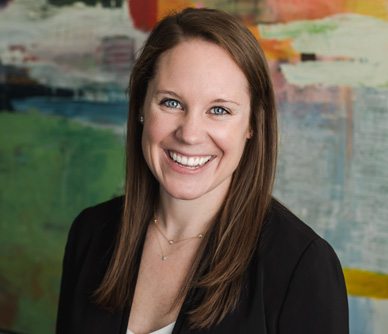The interview below is part of an ongoing effort by McGuireWoods to profile women leaders in private equity (PE). To read previous profiles, click here. To recommend a woman for a future interview, email WPEF@mcguirewoods.com.

Molly Williams Martin serves as a vice president with Silver Oak Services Partners, a lower-middle-market PE fund based in Evanston, Ill., focused on investments in business, healthcare and consumer services companies. She is responsible for originating, evaluating and executing new investment opportunities and working with portfolio company management teams on an ongoing basis. She currently serves on the board of directors of ION, Legacy Farms and Silver Oak’s pediatric dental practice management platform. Prior to Silver Oak, Martin was a vice president at 2x Consumer Products Growth Partners, a growth equity fund dedicated to investing in emerging consumer brands. Prior to 2x Partners, she served as an investment professional at Grand Crossing Capital, a family-backed PE fund focused on investments in the consumer and retail space. She began her career in the mergers and acquisitions group at BMO Capital Markets. Martin received an MBA from the Kellogg School of Management at Northwestern University and a BS in finance and economics from Villanova University.
Q: Why is it important for women to pursue careers in PE?
Molly Williams Martin: While there are a lot of men in the industry (understandably so as they created it), investment teams — and therefore returns — benefit from diverse thinking, and women offer that. We look at the world differently than men, and that’s important when considering the merits and risks of a potential investment (we also are pros at getting things done). The Bureau of Labor data show that people change jobs 10-plus times over their lifetimes, but investing is an apprentice model, requiring time and learning from others.
This is a challenging industry, but I’ve loved getting to know more women in senior roles within the PE community — seeing them have successful careers and hearing how they balanced their personal lives makes it more attainable and realistic for someone like me going forward.
Q: What is a lesson that you have learned concerning what’s required for success in PE?
MWM: We are in the people business. Our investments only work if our teams are successful. While we, as investors, must have a grasp of a company’s business model and financial viability, I would argue it’s equally as important to establish a strong relationship with the founders or management team. Understanding the CEO’s or CFO’s personality, motivations and communication style allows us to anticipate issues faster, make changes before they become major problems and, importantly, gain their trust. I’m obviously biased, but women excel at navigating personality types and showing empathy, and I have found this critical to the success of any partnership.
Q: What is a goal that you have set for yourself in the coming year?
MWM: This year I’ve been trying to do a better job staying connected to and expanding my network. There are never enough hours in the day, but carving out time to touch base or seek out new conversations is critical. You get fresh thinking, you might learn something about what’s going on in the market, and it generally helps develop and deepen your relationships. It never hurts to pay it forward on those conversations if you can offer a connection or helpful thought, as I’ve found that to come full circle. Plus, you never know where your next deal, limited partner, management/board hire, great piece of life advice — this list goes on — might come from, so I think that it’s worth the effort.
Q: Can you share any good advice that you’ve been given during your career?
MWM: There is a lot of pressure on the word “mentor.” To me, it feels too formal or implies too much of a commitment. I was once advised to establish my own personal board of directors. My “board members” never need to know that they are on my “board,” but it allows me to deliberately seek out a group of individuals who — in my mind — can add a lot of value at that time in my life. As with any board, I check in regularly and sometimes rotate individuals on and off the board, depending on where I’m at in life (you can always fire them; they’ll never know). It’s entirely mental/psychological, but I’ve found this analogy incredibly helpful, particularly with major life changes, and would encourage others to give it a try.
To contact Martin, email martin@silveroaksp.com.